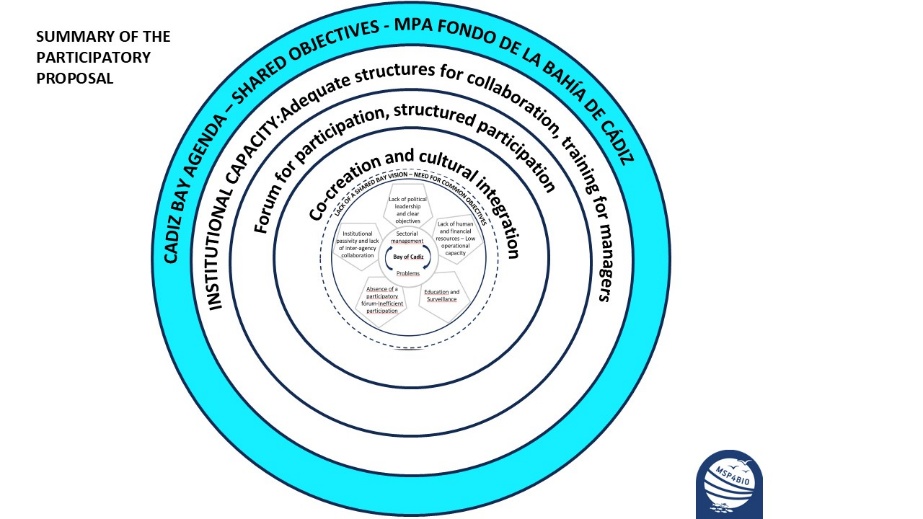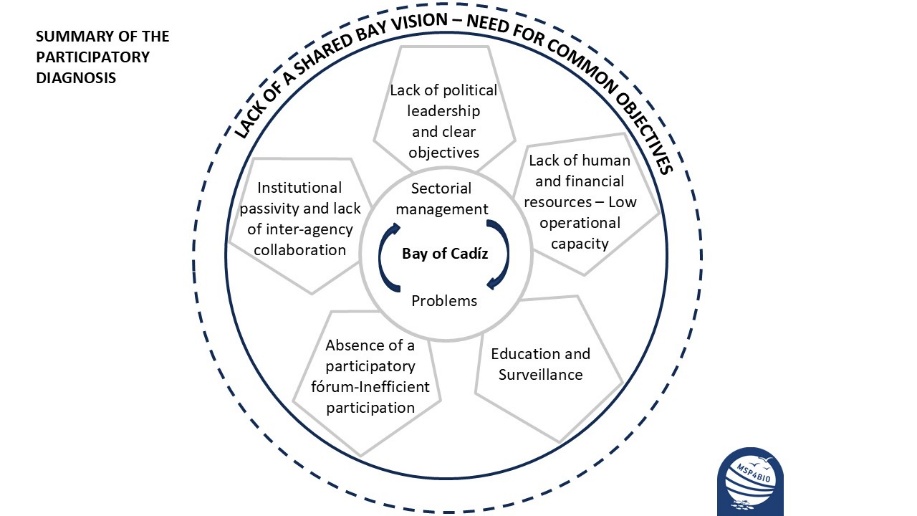Integrated Management Framework Proposal for the Cadiz Bay Test Site#
Q 27 - Are there good practices of MPA-MSP integration in terms of governance?
Q 27 - Are there good practices of MPA-MSP integration in terms of governance?
Q 28 - How to create/increase stakeholder knowledge, awareness and engagement on MPAs and MSP?
Q 30 - How to demostrate the effectiveness of conservation measures to stakeholders?
Description#
Description
This proposal outlines a strategic and participatory approach to developing an integrated land-sea management framework for the Bay of Cádiz. Over the three years of the MSP4BIO project, an inclusive co-creation process unfolded through a series of interactions with the Community of Practitioners (CoP) and regional stakeholders. Participation ranged from 10 to 40 individuals depending on the session, with consistently high levels of engagement and commitment to improving the governance of the Bay. Thanks to this deep and collaborative involvement, key governance gaps and needs were identified—such as the absence of participatory structures, weak institutional coordination, and a lack of operational capacity. These insights led to concrete, locally relevant proposals for a more integrated, transparent, and inclusive management system for the Bay of Cádiz. Bellow some of the proposals are briefly presented.
Collaborative Agenda and Funding Proposal
The initiative aims to define a shared agenda that integrates ecological, social, and economic priorities across institutions and sectors. The University of Cádiz plays a key facilitation role due to its perceived neutrality and leadership in current coordination efforts. Inspired by the ICZM strategy in Mar Menor, the proposal includes the creation of a dedicated fund to ensure stable financing of cross-sectoral projects, enabling long-term implementation of the shared goals of the agenda.
Land-sea Coordination Mechanisms in Cadiz Bay
A significant challenge identified in Cadiz Bay is fragmented governance, and to address this the shared goals (Cadiz Bay Agenda) is crucial, but not enough. It is needed to increase capacity building in the bay through the creation or reform of existing coordination bodies, fostering regular meetings between administrations, and increased transparency through the publication of meeting minutes. Strengthening ties with the South-Atlantic marine demarcation (one of the MSP areas in Spain) processes and assigning a regional coordinating authority are seen as essential next steps to foster land-sea coordination.
Stakeholder Engagement and Cultural Transformation
Public participation has traditionally been weak in Cadiz Bay. The proposal suggests transforming participation into cultural engagement by:
Reforming existing participatory bodies like the Junta Rectora (Natural Park participative body) or creating a new inclusive governance platform for the entire Bay.
Organizing regular, high-quality participatory meetings
Promoting training, education, and expert exchange
Hosting co-creation workshops involving local communities, artists, and scientists
These efforts aim to foster a shared identity tied to Cadiz Bay’s natural and cultural heritage, promoting long-term stewardship.
References to other ESE resources
While the ESE1, ESE2, and ESE3 approaches were introduced as part of the MSP4BIO framework, the participatory process in Cadiz Bay revealed that many stakeholders felt it was premature to implement operational tools of this kind. Instead, they emphasized the need to first address existing governance challenges in the Bay. There was a strong call to take a step back and reflect on how decisions are currently made, who is involved, and what structural changes are needed to enable future implementation efforts. As a result, in collaboration with the MSP4BIO partners responsible for Policy Solutions (Task 6.2), a tailored approach was developed. This new direction focused on strengthening the governance system of the Bay before applying further technical tools. The outcomes reflect a locally grounded understanding that policy and institutional alignment must come first, so that future tools and strategies can be more effective and actionable.
Other resources of inspiration
ICZM Strategy for the Socio-ecosystem of the Mar Menor (Spain)
Socio-ecological Studies in Natural Protected Areas: Linking Community Development and Conservation in Mexico (Springer, 2020)
Guidelines for Planning Marine Coastal Waters and the Adjacent Land Areas at the Local Level (Latvia – PanBalticScope Project)
During the final MSP4Bio event held in the Bay of Cádiz, a proposal that can support scale up some of the outcomes developed for the region was introduced by Professor Juan Manuel Barragán from the University of Cadiz: the Blue Bays Programme. This initiative advocates for the recognition of semi-enclosed coastal areas—such as the Bay of Cádiz—as Blue Bays, based on their ability to demonstrate integrated governance that balances ecological, social, cultural, and economic values. Building on the co-created findings of the MSP4BIO project, the Bay of Cádiz is well-positioned to serve as a pilot site for this emerging national or international initiative.
Resources#
Summary of the Participatory Proposal

The diagram illustrates the structured response that emerged from the participatory process to address the governance challenges in the Bay of Cádiz. It identifies four key layers of intervention, moving from strategic objectives to operational mechanisms.
Summary of the participatory diagnosis

This diagram presents the key governance and management issues currently affecting the Bay of Cádiz, as identified through stakeholder engagement. These problems form the foundation of the participatory proposal’s rationale.